#roman catalan
Explore tagged Tumblr posts
Text

Grand grand plaisir de lecture.
Je n’avais pas envie de les quitter, ni Natàlia, ni Silvia, ni Marius, ni Joan, ni Encarda, bref, toute cette famille espagnole compliquée qui vivait sans le savoir les dernières heures du franquisme.
Roman catalan débordant de vie. Galerie de personnages plus vrais que vrais, avec des scènes incroyables (la séance Tupperware des femmes au foyer qui dégénère), drôles ou émouvantes.
Natàlia est partie de Barcelone en 1962, très jeune. On comprend que c’est en raison d’un conflit avec son père (happé par le dogme puritain de l’époque qui condamne tout dérapage), et d’un grand désir de liberté. Elle a vécu à Paris, puis Londres, s’est forgé son lot d’expériences, sa façon de se construire une féminité bien à elle, qui l’empêchera d’être corsetée comme la femme de son frère Lluis par exemple, malade de frustration. Elle revient douze ans plus tard, en 1974, et constate que ses proches ont changé, par exemple, sa tante, qui a perdu son mari s’en trouve étonnamment apaisée, libérée, que la bonne de la famille, assez âgée, a décidé de se marier… un vent de liberté se lève, imperceptiblement.
Ce qui est génial dans ce livre, c’est l’énergie qui circule, la vie même. Les dialogues, piquants, sont insérés dans la narration, englobés, et ça rend le récit plus vif, enlevé, rythmé de paroles qui sonnent justes.
On découvre des pans des histoires de plusieurs personnages, dont celle du père de Natàlia, et de son mariage d’amour avec l’étonnante Judit. Rien n’est lisse, simple, ni caricatural, tout est mouvement, paradoxe, surprise. Voilà sans doute pourquoi on s’attache vite et fort aux personnages.
Natàlia n’écrase personne avec des idées arrêtées sur l’existence, elle écoute, simplement, observe. D’ailleurs elle est photographe. Elle est finalement le personnage révélateur, comme un bain d’étape dans le développement d’une photo, des personnalités autour d’elle. Son exil a contrarié ou a été condamné, ou jalousé. Mais son retour, sans changer radicalement la donne, aide à des ajustements, des épiphanies. Et le secret qu’on voulait lui cacher, une fois révélé, donne lieu à un bel épilogue, qui célèbre l’amour et le pardon.
Superbe livre, qui a été traduit très récemment en français pour la première fois par les éditions La Croisée, qui décidément, ont le chic pour dénicher des voix fortes dans la littérature de partout.
#littérature#livres#litterature#roman#livre#éditions la croisée#roman catalan#le temps des cerises#Montserrat Roig
4 notes
·
View notes
Text
Promenade romane dans l' Alt Empordà : Circuit découverte
Le 19 novembre prochain, l’ Association culturelle de Cuxa vous propose de franchir la frontière et de partir à la découverte de trois monuments emblématiques de l’art roman catalan. L’église Santa Eulàlia de Vilanova de la Muga qui abrite de remarquables peintures romanes, l’église canoniale augustinienne de Santa-Maria de Vilabertran et, dominant la mer dans un site grandiose, le monumental…

View On WordPress
#Alt Empordà#Association culturelle de Cuxa#catalan#église Santa Eulàlia de Vilanova de la Muga#monastère#monuments#promenade#romane#Sant Pere de Rodes
0 notes
Text





Bon, n'étant pas très mobile, difficile de créer des posts avec de nouvelles photos. Je reviens donc à mon projet de présenter l'intégralité de mes photos, projet interrompu à l'année 2017. Je vais donc essayer de clore cette année 2017. Et elle sera close par Marseille aux vacances de Noël.
Les 2 premières : le Musée d'Histoire de Marseille:
pied féminin - Marseille , les Catalans, époque romaine
graffiti - Marseille Massalia, VIe s. av.J-C (on devine un profil barbu)
Puis le MuCEM avec une mini-expo : "Roman-Photo". Alors oui ,on reconnaît Mireille Mathieu !
("Ahh ! Salaud... Maudit salaud...")
#souvenir#marseille#musée d'histoire#rome antique#les catalans#massalia#graffiti#barbe#MuCEM#roman-photo#expo#fotonovela#mireille mathieu#images d'épinal
1 note
·
View note
Text



"We were outsiders when we came here. Spaniards, Catalans. And we endured the insults. The taunts of Murano. The insidious invective of the Roman nobility. And you, dear mother, endured it most of all. But if we managed to triumph, and triumph we did, we did because of the warmth that we discovered around this table. The warmth of the Spanish sun, of our Catalan blood. That you recreated in your hearth, in your home. At this table. The huge, unstoppable, beating heart of La Madre." — JUAN BORGIA | THE BORGIAS (2.03)
#that's my tragic twisted family...#such an interesting moment when he acknowledged that their mom is an 'apron matron'. i love vannozza so much actually !!#his recollection of the spanish heat + the bullying/xenophobic attacks has shaped his current defensive and arrogant behavior#he perceives commoners as threats and consistently adopts an aggressive stance whenever someone approaches him or his family#especially how he becomes fiercely protective of his mom and sister to an extreme degree that they find extremely unsettling#juan borgia#the borgias#perioddramaedit#tvedit#cinemapix#tvarchive#weloveperioddrama#perioddramasource#onlyperioddramas#dailyflicks#tvfilmgifs#theborgiasedit#tvgifs#userzal#by jen
318 notes
·
View notes
Text

EARLY CHRISTIAN PAINTER, Catalan Head of a woman 4th century Fresco Roman villa, Centcelles
106 notes
·
View notes
Text
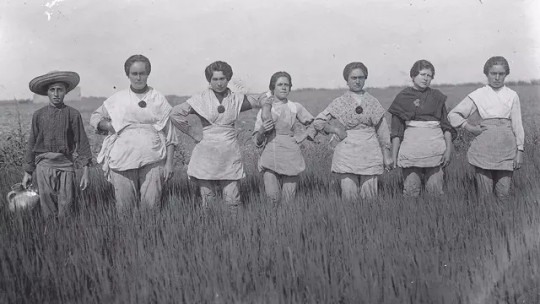
A group of weeders standing in a rice field in Amposta (Terres de l'Ebre, Catalonia). I couldn't find the date but it's most likely from the 1920s-1940s. Photo from Museu de les Terres de l'Ebre.
This photo is interesting because it shows the traditional clothes that women from the Ebro Delta wore until the 20th century. It's very different from the image most people think of when we imagine "traditional women's clothes". The truth is that many countries (including ours when it comes to the pubilla and hereu outfit) fixed their "national costume" in the early 1900s, taking the upper class formal clothes as "the traditional clothes". However, that is not representative of the country in general, particularly of the working classes, nor of the many local variations that are always found around a country.
These weeders are wearing saragüells, which are a kind of tight-fitting trousers made of a light material that can dry easily. On top of this trousers, they wore a skirt that they rolled up to their waist. The reason behind this being the usual work clothes for women in the Ebro Delta area is because it's an area where, since 1860, most people worked in the agriculture of rice. Rice is grown in water, so they worked with their feet and lower part of legs in the water. (Ah, and by the way, yes, of course most women historically worked outside of the home, too.)
Now, here's why I find this interesting: the various dictatorships of Spain who called themselves "traditionalist" (Primo de Rivera's and Franco's) and their followers for many years forbid women from wearing trousers in many ambits or raged against women in trousers for being immoral. How is it possible that "traditionalists" said that, when there are traditional/historical clothes for women that include trousers? Don't "traditionalists" stand for keeping traditions? Well, let's hear the words of one of the movement's founders:
“For the authentic revolutionary conservative, what really counts is to be faithful not to past forms and institutions, but rather to principles of which such forms and institutions have been particular expressions, adequate for a specific period of time and in a specific geographical area.” Julius Evola, Men Among the Ruins: Post-War Reflections of a Radical Traditionalist.
This was said by Julius Evola (1898-1974), one of the ideologues of traditionalism. What he's saying here is that the point of traditionalism is not to be faithful to what the past or the tradition really was like; the point of traditionalism is to have some a priori beliefs and then look back in history and cherry-pick some places where that was the case. History is long and includes millennia of different cultures, you're bound to find pretty much everything at some point, and easily those ideas that have been the status quo in the immediate previous years (which is what they defend). This is why traditionalists defend that European powers are the heirs of Imperial Rome and have claims on other countries as such, but consider things that were completely normal in Ancient Roman culture (homosexuality, multi-racial cities, racial mixing) are not part of what they defend. It was never about following a real tradition or history, that was just an excuse.
These so-called "traditionalist" governments also pick one singular culture from the whole area instead of allowing each area to continue their traditional way of life. In the case of the Spanish dictatorships, exterminating the traditional customs, languages and cultural elements of the nations whose land Spain occupies (Catalans, Basques, Galicians, Aranese...) was a priority. They banned the languages, holidays, songs, and more. At the same time, they imposed one singular language (Spanish), religion (Catholicism), and the holidays, traditions (like bull-fighting), music, etc. of the Spanish with an emphasis on folklore from Andalusia (Southern Spain).
As a historian, it saddens me when people believe that what traditionalists say is really what the past was like, and nowhere do I see more lies than in what the "tradwife" movement have been led to believe. The real past was so much more interesting.
And speaking of trousers... Did you know that France had an 18th-century law that forbid women from wearing trousers which wasn't repealed until 2013? In 1972, the French politician Michèle Alliot-Marie was banned from entering the French Parliament because she was committing the crime of wearing trousers!
#amposta#catalunya#història#fashion#anthropology#fashion history#folk fashion#traditional clothes#europe#history#traditional costume#national costume#traditional fashion#women's history#rice#rice fields#cultures#culture#ethnography
77 notes
·
View notes
Text
The "Mantilla" is not Reverent, not Traditional, and not Catholic. It isn't Even a Veil.
The mantilla, a lacy, sometimes sparkly, transparent, half-circle or triangle-shaped garment, is often lauded as a traditional, reverent, catholic piece of church clothing, but it is none of the above. The mantilla is the long-lived fashion of the secular Spanish aristocracy, and until recently, was exclusive to those regions under Spanish influence and colonialism (absoloutly not universal or catholic). They were worn by women who didn't want to cover their pretty Catalan locks-- as good a reason as any to manipulate the traditions of the Church.
For a time, mantillas were even banned in the New World, and women wearing them would be denied communion. Why? Because the mantilla is not a veil. It's transparent-- in no way does it cover a woman's hair in the way Saint Paul described in Corinthians. He writes, "every woman who prays or prophesies with her head uncovered dishonors her head, for that is one and the same as if her head were shaved. For if a woman is not covered, let her also be shorn. But if it is shameful for a woman to be shorn or shaved, let her be covered." Women's heads and hair should be covered-- not adorned with glittering table coasters.

Fully ridiculous. Look me straight in the eyeballs and tell me this is what St. Paul had in mind when he told women to cover their heads. Be serious.
Though in Christianity, women do not veil out of any kind of modesty (or 'modesty'), the mantilla is immodest as it makes the practice of veiling into a fashion statement, which is what the mantilla always was since its very invention. It is not merely fashion (picking out a veil in a color that matches your outfit), but fashion meant to skirt the actual requirements of the church-- that is, a real, opaque veil that resembles something the historical church would've worn from the days of Pentecost to any time before the so-called Enlightenment. It would be better to wear no head covering of any kind or to simply braid your hair, than to engage in a practice of obstinate adornment. This is not my opinion as an Orthodox Christian (where proper veiling is more common but still not universal)-- it is the opinion of the historical Christian Church until about five seconds ago.
There is debate among Christians who study this teaching about whether Paul's words imply that the entirety of the hair (with the possible exception of bangs) should be covered, or if he means more specifically the head itself (allowing the length of the hair to hang out of the back of a veil). I do not feel strongly either way (in a theological sense) so long as the material is opaque and actually covers at least the area of the skull. That is the bare minimum of what Saint Paul writes.
Here are some examples of proper veils in a church environment:
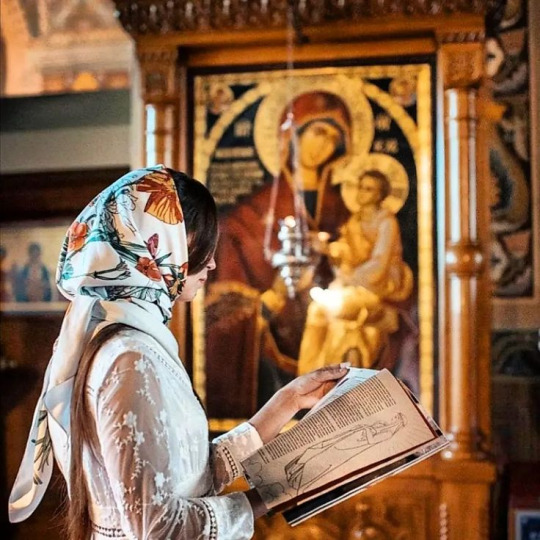
I find this very pretty, but all I can think about is the satin slipping for all of the Divine Liturgy. I always have to clip and pin and have it tightly fastened before the curve of my skull.

Probably do not bring the sheep into the Church building.

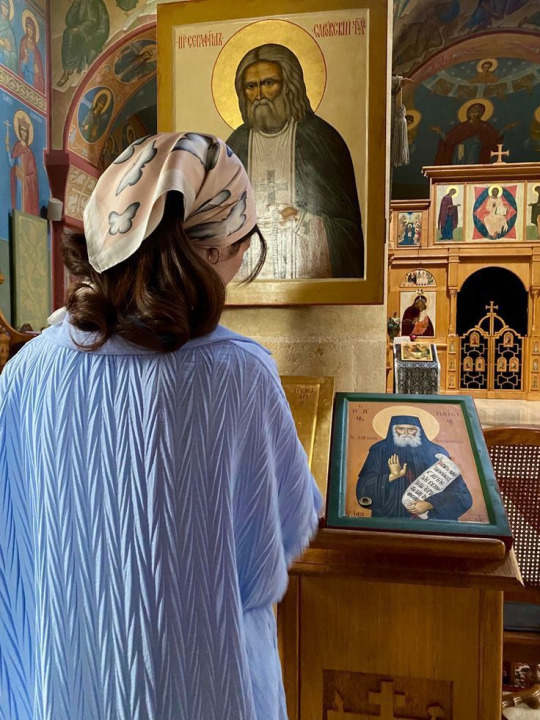



The infatuation with mantillas in the non-Spanish/Latin world began, as far as I can surmise, piecemeal in the late 1800s, picking up to an almost universal practice after Vatican II. This is to say, now, when Roman Catholic women veil, they almost always wear a mantilla. Before the 60s, European and white American RC women mostly wore hats as their form of head covering, which are their own issue, mostly related to fashion and insufficient coverage. Is a "pillbox hat" really a head covering Saint Paul would find acceptable? But at least they're opaque, right? Well, I should pick my battles.

I believe the reason the mantilla is particularly popular among young Roman Catholic women is due to the way RC influencers and 'gurus' talk about the purpose of veiling.
The actual purpose of veiling is to submit to the commands of God as recorded by Saint Paul. This following of a commandment allows you to be properly reverent and to be in communion with the historical practices of the church, past, present, and future. It's a simple reason, not very wild, controversial, or entertaining. That's the problem for RC lady influencers-- there are only so many ways you can quote the letters to the Corinthians.
So, these women feel the need to make up other reasons to veil, all of which range from tangential, to irrelevant, to heretical. Here are some doozies:
To Imitate Mary
Now, we do many things to imitate Mary-- notably, repeating her Magnificat. But Mary did not invent veiling. Veiling is a near-universal cultural practice, performed for many reasons. Of course, Mary rightfully and righteously participated in the veiling of Christianity, but she is not the reason why we veil (or ought to).

Notice how she covers herself?
2. To 'Express your Femininity'
Kill me now. Ok, it is fine and good if veiling makes you feel feminine or gets you more in touch with your femininity. That is a blessing. I know I never feel more beautiful than when I'm veiling, but this is not a reason we veil! Veiling is not about our internal feelings; it's about following a commandment.

Ohh yeah this is definitely Apostolic.
3. For Modesty
We've been over this one. Stop confusing Christianity with Muhammad's movement. Seriously, can we find a middle ground between imitating degenerate secular aristocracy and the false prophet's wives? At this point, I'm begging you.

4. To Show the Beauty of the Church
I am so sorry for you if you do not see the genuine beauty in the proper, traditional veiling of the Church. I don't know what else to tell you than that there is no tradition of the church that exists merely for your aesthetic entertainment. No statue carved nor icon writ, no paint spilled nor incense burned, no note sung, no vestment sewn has ever, ever been done merely because it is pretty. I understand the inclination to aesthetically prefer glittering lace that may dance in chapel light over a flat Pashmina or Pavlovsky Posad. However, I find it mind-boggling that this would seem a sufficient reason to abandon what the Scriptures actually demand. This is just as ridiculous as it would be to apostatize to Hinduism because you find their temples more visually appealing. You know what else is very sparkly and pretty? The Imam Ali Shrine in Iraq. Dazzling. But that does not make it part of the Christian Church. You must have the willpower and discernment to place what the Church demands above your personal fancies.
Women are so confused about veiling and the reasons why we must do it, is because veiling is no longer "simply what we do," as it has been both culturally and religiously until very recently. It is now, among RCs, an issue of controversy, somehow requiring justifications and auxiliary reasonings. It is not enough that Scripture demands it, the Church teaches it, and Her saints keep it-- there must be all these other reasons. This degradation of the veil began with things like the mantilla in Spain, the mesh bonnet and literal doyllie in Northern France and England, and other global innovations upon and rejections of the veil. We, as a Church, do not go from the wimple, to the mantilla, to a naked head over a few extremely progressive evenings. It was incremental, and participation in the mantilla only pushes us farther down the path of innovation.

If beauty is a real concern of yours, and no judgment if it is --the woman's heart years for beauty in a special and important way-- I think you'll find that the traditional veil allows just as much beauty and personal touch as the mantilla, if not much much more. Experimenting with veil styles is a small hobby of mine, and I feel accomplished when I can get the fabric to lay just right. My personal favorite is what I call the "cat ear" style, where there are two little peaks of fabric on the top of the head. Adorable.
Free yourself from mantilla mind slavery.
#veil#veiling#christian veiling#orthodox veiling#catholic veiling#christianity#orthodox#eastern orthodoxy#greek orthodox#orthodox christian#christian blog#russian orthodox#orthodox christianity#orthodoxy#catholic#mantilla#headcovering#head covering#head-covering#modesty#christian modesty#orthodox modesty#catholic modesty#catholicism#cathedral#roman catholic#catholic art#eastern catholic#modest girl#modest fashion
52 notes
·
View notes
Text

Temple Expiatori del Sagrat Cor, Catholic church, Barcelona, Spain: The Temple Expiatori del Sagrat Cor is a Roman Catholic church and minor basilica located on the summit of Mount Tibidabo in Barcelona, Catalonia. The building is the work of the Catalan architect Enric Sagnier and was completed by his son Josep Maria Sagnier i Vidal. Wikipedia
83 notes
·
View notes
Photo
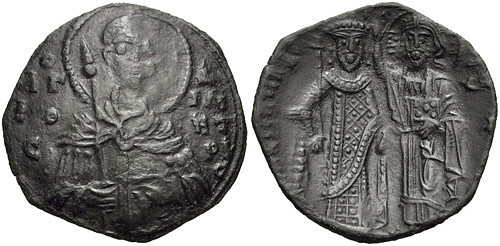
Thessaly and the Duchy of Neopatras
Thessaly was an independent state in medieval Greece from 1267 or 1268 to 1394 CE, first as the Greek-ruled Thessaly and later as the Catalan and Latin-ruled Duchy of Neopatras. Under its sebastokrators, Thessaly was a thorn in the side of the Byzantine Empire and an ally of the Latin states in Greece and southern Italy. Following the death of the last Thessalian sebastokrator in 1318 CE, the Duchy of Neopatras was established by the Catalans and combined with the Duchy of Athens, with the two states mostly sharing the same rulers and fortunes until Thessaly was finally conquered by the Ottoman Turks in 1423 CE.
Beginnings in Epirus
Following the Fourth Crusade's sacking of Constantinople in 1204 CE, the Byzantine Empire splintered into a series of successor states. Thessaly was originally held by the regional Greek leader Leo Sgouros, but when the Latin crusaders arrived, the territory was quickly taken over by Latin lords under the nominal leadership of Boniface of Montferrat, the new King of Thessalonica (r. 1205-1207 CE). Latin rule in Thessaly was short-lived, however, and in 1212 CE, Michael I Komnenos Doukas of Epirus (r. 1205-1215 CE) occupied central Thessaly, including the key city of Larissa, and the rest of Thessaly was conquered by his half-brother and successor, Theodore Komnenos Doukas (r. 1215-1230 CE). Epirus was one of the three long-lasting Greek (or rather Roman) successor states to the Byzantine Empire, and it was initially quite successful, conquering Thessalonica, restyling itself the Empire of Thessalonica, and advancing almost to the gates of Constantinople itself before Theodore suffered a horrific defeat at the Battle of Klokotnitsa in 1230 CE.
In the aftermath of Klokotnitsa, Manuel Komnenos Doukas (r. 1230-1241 CE) took up power in Thessalonica while his relative Michael II Komnenos Doukas (r. 1230-1267/1268 CE) became the ruler of Epirus. Thessaly was ruled by the Empire of Thessalonica during this decade of contraction, but when Manuel was ousted from Thessalonica in 1237 CE by the returned Theodore, he went to Thessaly, where he ruled the region as an independent state from 1239 to 1241 CE. Upon his death, Thessaly fell to Michael II of Epirus, being reincorporated into the Despotate of Epirus. The region was briefly occupied by the Empire of Nicaea in 1259 but was reoccupied by Epirote forces the following year.
Continue reading...
37 notes
·
View notes
Text
Indigenous people of Europe
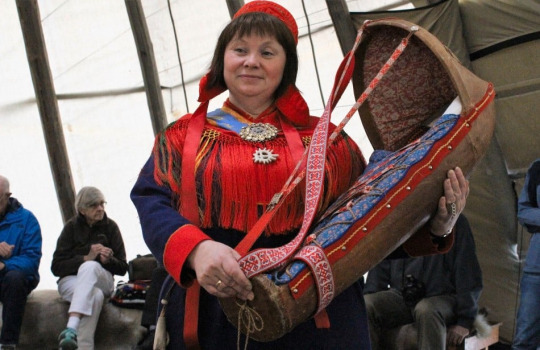
Let me talk about something that really is not talked and thought about in general: The indigenous people of Europe. Because, well, it is something that kinda tends to get ignored often enough, as we think of indigenous cultures as something that existed outside of Europe, before being settled by Europeans.
But it is a lot more complicated than that. Because there were indigenous people in Europe - and there still are to this day. The best known example are probably the Sami in northern Russia and the Scandinavian countries. And be it just because they got depicted in Frozen and in the Klaus Netflix movie.
To quote Wikipedia:
Some groups that claim indigenous minority status in Europe include the Uralic Nenets, Samoyed, and Komi peoples of northern Russia; Circassians of southern Russia and the North Caucasus; Crimean Tatars, Krymchaks and Crimean Karaites of Crimea (Ukraine); Sámi peoples of northern Norway, Sweden, and Finland and northwestern Russia (in an area also referred to as Sápmi); Galicians of Galicia, Spain; Catalans of Catalonia, Spain and southern France; Basques of Basque Country, Spain and southern France; and the Sorbian people of Germany and Poland.
Indigineity in Europe is a complicated thing, because even the non-indigenous people here have been around in this area for a long while. It also is closely related to the artificiality of "whiteness" (I am gonna talk about that a bit more next week).
In the end the "western European culture" as we know it is mostly a result of colonialism through the Romans. Only that this happened 2000 years ago and in a process that was not quite comparable to how colonialism of the non-European regions went.
Though then again, there was a phase during which similar genocide happened within Europe, when it came to the indigenous cultures and religions: The heathen hunts in the 4th century, which did involve the killing of followers of older religions, destruction of temples and religious places of worship and the forceful conversion of the "heathens" to Christianity.
But, again, this happened a long, long time ago. Which is why it tends to not be remembered as such. (In fact, I doubt most people know about this happening.)
There were more indigenous people in Europe before that, but one by one most of those cultures just disappeared.
Still, those that remained often face often similar problems to non-European indigenous people. As minorities they tend to be discriminated against, at times even by law. The borders often do not allow them to move through what has originally been their territory. And many have had their land taken away from them - or still get their land taken.
And given that most people are not even aware that those groups exists, this topic tends to get ignored by a lot of people.
So, yeah, I just wanted to talk about this. Because we really need to be aware about what is happening everywhere. And how those things have happened over thousands of years.
115 notes
·
View notes
Photo

The Roman Blouse - Marc Figueras
Catalan, b. 1981 -
Oil on canvas , 60 x 60 cm . 23 3/5 × 23 3/5 in .
191 notes
·
View notes
Text
Groupe 1: Notre lecture du mois de juin sera Le Comte de Monte-Cristo, d'Alexandre Dumas (tome 1 seulement)

Le roman raconte comment, au début du règne de Louis XVIII, le 24 février 1815, alors que Napoléon se prépare à quitter l'île d'Elbe pour les Cent Jours, Edmond Dantès, jeune marin de dix-neuf ans, débarque à Marseille pour s'y marier avec la belle Catalane Mercédès. Trahi par des « amis » jaloux, il est dénoncé comme conspirateur bonapartiste et enfermé dans une geôle du château d'If, au large de Marseille. Après quatorze années, d'abord réduit à la solitude et au désespoir puis régénéré et instruit en secret par un compagnon de captivité qui lui donne une carte avec l'emplacement d'un trésor, l'abbé Faria, il réussit à s'évader et prend possession du trésor caché dans l'île de Montecristo. Rendu riche et puissant, Dantès se fait passer pour divers personnages, dont le comte de Monte-Cristo. Il entreprend de garantir le bonheur et la liberté aux rares qui lui sont restés fidèles et de se venger méthodiquement de ceux qui l'ont accusé à tort et fait emprisonner.
Pour lire en ligne/télécharger: https://gutenberg.org/ebooks/17989
Pour rejoindre le groupe sur discord
32 notes
·
View notes
Text
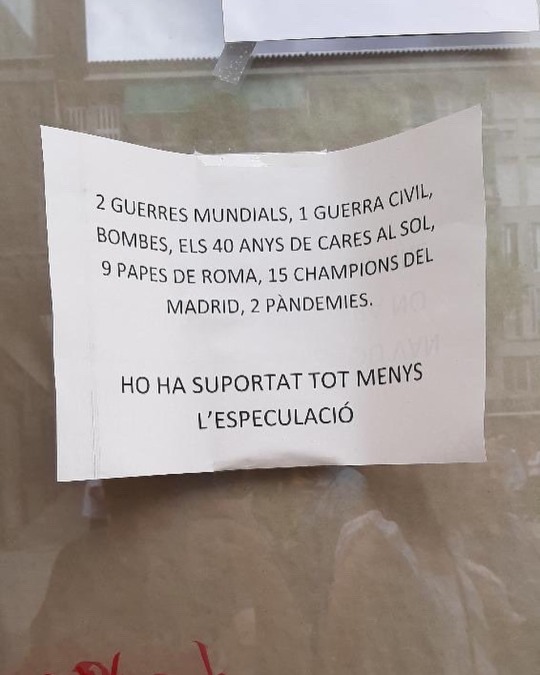

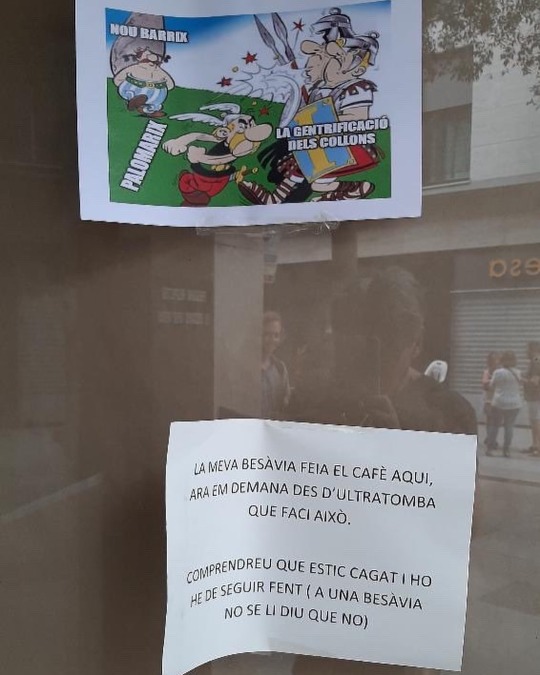
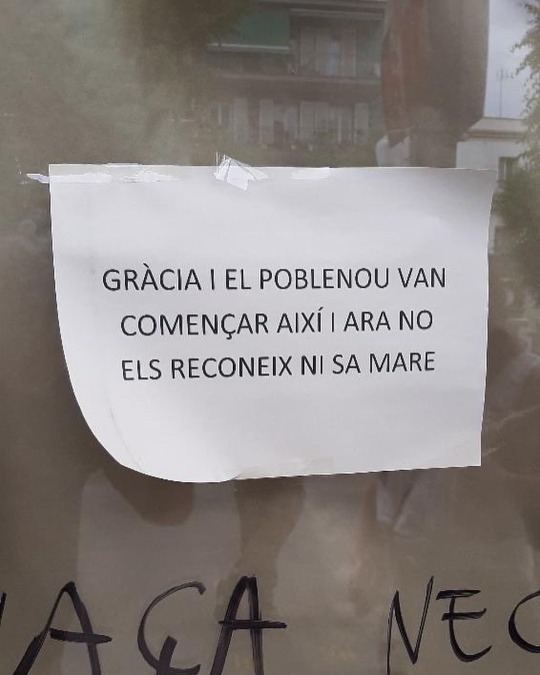
Someone has been sticking these printed papers on small local businesses that are closing down as a result of gentrification in Barcelona (Catalonia's capital city, greatly affected by touristic massification and the gentrification it brings). They're written in the Catalan language, so here I translate them to English for you:
2 world wars, 1 civil war, bombs, the 40 years "facing the sun" [=first line of the anthem of Spain during the Francoist dictatorship], 9 popes, 15 times Real Madrid won the Champions League, 2 pandemics. It has survived everything except speculation.
Maybe 10,000 bucks for rent was a little teeny tiny bit too much, wasn't it? Maybe. I'm not saying it was. I'm just saying: maybe.
If they open a Starbucks or something like that, I'm cutting off my dick. Bring back Versalles [convenience store]!
*A picture of Asterix and Obelix hitting two Roman soldiers. Asterix and Obelix are labelled Nou Barrix and Palomarix as a joke of Gaulish-sounding names for the working class neighbourhoods of Nou Barris and Sant Andreu del Palomar. The Roman soldiers are labelled "the fucking gentrification".*
My great-grandma used to come for coffee here, now she's asking me to do this from the Other Side. You'll understand that I'm so scared that I'm shitting myself and I must continue doing it (one can't say no to a great-grandmother)
Gràcia and Poblenou [two neighbourhoods of Barcelona that have gotten very gentrified by tourists] started like this and now not even their mother would recognise them.
Photos from Et felicito fill.
#gentrification#barcelona#catalunya#europe#tourism#tourist#housing crisis#actualitat#humor#memes#anti capitalism#coses de la terra
159 notes
·
View notes
Text





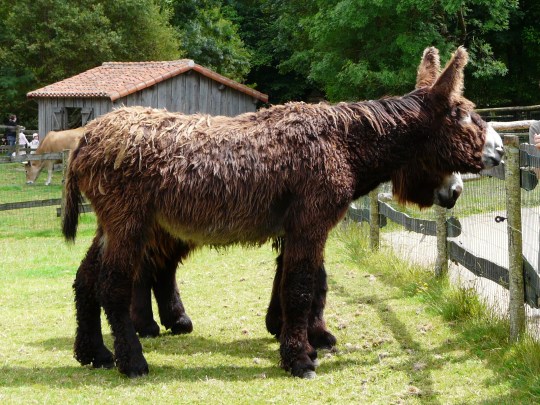




The Baudet du Poitou, also called the Poitevin or Poitou donkey, is a large French breed of domestic donkey. The exact origins of the Poitou breed are unknown, but donkeys may have been introduced to the Poitou region of France by the Roman Empire. The Baudet de Poitou and the Mulassière horse breed were developed together for the use of producing superior mules. In the Middle Ages, owning a Poitou donkey may have been a status symbol among the local French nobility. In the mid-1800s, Poitevin mules were "regarded as the finest and strongest in France", and between 15,000 and 18,000 were sold annually. In 1884, a studbook was established for the Poitou donkey in France. During the first half of the twentieth century, the mules bred by the Poitou and the Poitevin continued to be desired throughout Europe, and were called the "finest working mule in the world". As mechanization increased around World War II, mules became outmoded, and the Poitou donkey population fell dramatically. After a a breed census in 1977 found only 44 Poitou donkeys worldwide, conservation efforts were led by several public and private groups in France and Portugal. These efforts proved successful and today around 2,000 Poitou donkeys are known. With females reaching 4.6 (1.4m) tall at the shoulders, and males reaching 5.2ft (1.56m), the Baudet is a one of the largest breeds of domestic donkey with only the Catalan, Mammoth Jack, Andalusian, and Balearic breeds reaching similar or larger sizes. They have large, long heads, strong necks, long backs, short croups and round haunches. The limb joints and feet are large, and the legs strong.The temperament has been described as "friendly, affectionate and docile". In Poitou, the coat of the Baudet was traditionally – and deliberately – left ungroomed; with time, it formed cadenettes aka long shaggy locks somewhat like dreadlocks. The coat is typically dark brown to black but may also by silver, dark grey, or red.
#pleistocene pride#pliestocene pride#cenozoic#donkey#poitou donkey#france#livestock#animal#animal facts#Baudet du Poitou#Poitevin#poitou
9 notes
·
View notes
Text
❀𝒔𝒕𝒖𝒅𝒚𝒃𝒍𝒓 𝒊𝒏𝒕𝒓𝒐❀
Hi there! My name is Phi, I’m from the UK and I’m currently studying a Linguistics and Languages degree. My dream is to become a Speech Therapist (also an author, translator and language teacher on the side - I have a lot of dreams, and most of them are about words!) ˚ʚ♡ɞ˚
why have I made this blog?
Since I am a distance-learning student, it can sometimes be difficult to find the motivation to study so I really hope this blog will hold me accountable and keep me productive.
I also really admire the studyblr & langblr communities and hope to make some friends who are similarly passionate about all things languages! ˚ʚ♡ɞ˚
what languages will I post about?
Languages I speak/ am currently learning:
♡ English (Native/ C2)
Posts will be tagged #english and/or #english resources
♡ Castilian Spanish (intermediate to advanced/ B2 -> C1)
Posts will be tagged #castellano and/or #recursos castellano
Please note: I refer to the language as Castilian/ castellano instead of Spanish/ español out of respect for the co-official languages of Spain and also to recognise the language’s divergence from its Latin American variants
♡ German (Beginner/ A2)
Posts will be tagged #deutsch and/or #deutsche Ressourcen
⭒ I will make posts expanding on my background with each language soon ⭒
Languages I hope to start studying soon:
♡ Scottish Gaelic
I intend to begin independent study of Gàidhlig in September - October 2024 and I’m so excited!
♡ Russian
My friend and I are going to begin buddy learning Russian in March 2025 and I can’t wait!
♡ Catalan
I’m so excited to learn Catalan but, given its similarities with Spanish, I don’t want to confuse myself. So I intend to start learning it when I have finished my degree in May 2027!
⭒ If you have any questions or advice for me based on these languages, please don’t hesitate to drop me an ask or a message ⭒
Other languages I’m interested in (warning: there’s a lot):
♡ Irish, Welsh, Scots, Cornish, Manx, Greek, Danish, Finnish, Norwegian, Swedish, Icelandic, Dutch, Italian (especially Sicilian), Cherokee, Navajo, Guarani, Xhosa, Afrikaans, Korean, Yiddish, Hebrew, Bengali, Basque, French, Monegasque, Portuguese, Arabic, Ladino, Old/ Middle English, Hawaiian, Cantonese
What are my other passions?
♡ Books and poetry (I have a book blog @phireads if you’re interested)
♡ Writing
♡ Fibre arts (mainly knitting, crochet and sewing - though I really want to try embroidery and beading)
♡ Baking
♡ Reading
♡ Language conservation
♡ Wildlife (especially British, especially birds)
♡ Period Dramas
♡ History (with a focus on fashion history)
♡ Classics (as in Greco-Roman, my study buddy is a marble bust of the Greek poet, Homer, who is the namesake of this blog)
⭒ That’s all for now, I’ll be regularly posting study content at the end of September with the start of the academic year. So excited to meet you all! ⭒
10 notes
·
View notes
Note
Sorry for being dumb but can you give any examples of traditional Catalan girls names or Roman/greek mythology names🤣 maybe ones that suit Bambi or not I just don’t have an idea lol
So for Catalan names something like Ariadna (which is also the Catalan form of the name Ariadne, the princess from Greek mythology) or Caterina or Valèria. I think if Alexia gave Bambi a Catalan name then it would be a strong name that would look good on an adult as Bambi grew up.
For Greek inspired names then something like Theia or Selene or Asteria
Roman inspired names would be something like Flora or Aurora
15 notes
·
View notes